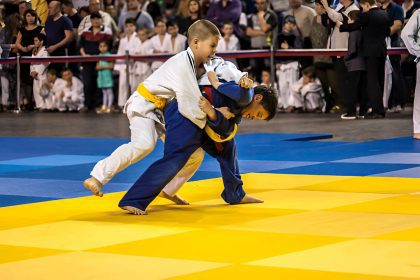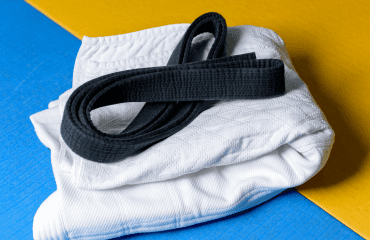
Brazilian Jiu-Jitsu (BJJ) has been gaining popularity among children worldwide, thanks to its unique approach to martial arts that emphasizes respect, discipline, and self-improvement. At Noco Jiu-Jitsu and Self-Defense, we’ve seen firsthand the profound impact of Children’s Brazilian Jiu-Jitsu in enhancing young practitioners’ confidence and discipline. Beyond building physical strength, BJJ instills valuable life lessons such as persistence, humility, and the importance of continuous learning. These foundational skills equip children with the mindset and discipline to navigate life’s challenges, both on and off the mats. This guide will explore the numerous benefits BJJ offers to children and provide parents with essential information on how to get started.
The Fundamentals of Brazilian Jiu-Jitsu for Kids
Brazilian Jiu-Jitsu (BJJ) traces its history back to Japan, but it was in Brazil where the Gracie family refined and popularized it, giving rise to the style known today. This martial art embodies a philosophy of persistence, resilience, and continuous improvement, values that are imparted to young practitioners from their very first lesson. BJJ teaches more than just physical skills; it fosters a mindset of respect, discipline, and humility, making it a comprehensive tool for personal development in children.
Unlike other martial arts that may focus heavily on striking and kicking, BJJ’s unique approach is designed to equip individuals with the knowledge to control an opponent through holds and locks. For kids, this means learning how to use leverage and technique to their advantage, offering them a way to protect themselves and build confidence in their abilities. This emphasis on control and strategy over brute force ensures that BJJ can be safely practiced by children, providing them with a solid foundation not only in self-defense but also in life skills such as problem-solving and critical thinking.
Building Blocks of Confidence Through BJJ
Training in BJJ instills a strong sense of self-esteem in children. By mastering new techniques and overcoming challenges, young practitioners learn to believe in their abilities, translating to increased confidence in and out of the dojo. This growth is further nurtured through the structure of BJJ classes, which emphasize discipline, respect, and perseverance. Children learn the value of hard work and the rewards of persistence, which are fundamental components of confidence.
Additionally, Brazilian Jiu-Jitsu provides a supportive community where children can engage socially, work as part of a team, and learn from both successes and setbacks in a controlled environment. This social aspect of BJJ training helps children to develop communication skills and emotional intelligence, key factors in building self-assuredness and a positive self-image. The lessons learned on the mats—such as dealing with defeat gracefully and celebrating victories modestly—equip children with a well-rounded sense of confidence that benefits every area of their lives.
The Discipline of the Gentle Art
The structured environment of BJJ teaches children the value of discipline, patience, and persistence. These lessons in self-control and respect for others carry over into their daily lives, positively impacting their behavior and decision-making. Brazilian Jiu-Jitsu, often referred to as the “gentle art,” emphasizes technique over strength, encouraging children to apply strategic thinking and problem-solving skills both on and off the mat. This approach fosters a disciplined mindset, where focus and dedication are key to mastering complex techniques.
In everyday life, the discipline practices within BJJ training manifest in various beneficial ways for children, including:
- Improved Focus: Regular training requires children to pay attention to detail and concentrate for extended periods, enhancing their ability to focus in academic and other settings.
- Better Time Management: Attending regular classes and dedicating time to practice instills a sense of responsibility and time management.
- Increased Respect for Others: The practice of bowing to the instructor and training partners in BJJ promotes a culture of mutual respect. This teaches children to value and consider others’ perspectives and space, leading to more respectful interactions outside the dojo.
- Enhanced Problem-Solving Skills: BJJ is like physical chess; children learn to anticipate and counter their opponent’s moves, which sharpens their problem-solving skills, applicable to real-world challenges.
- Strengthened Perseverance: Overcoming the challenges of learning BJJ techniques teaches children the value of persistence. They learn that dedication and hard work lead to improvement, a lesson they can apply to academic pursuits, personal goals, and future challenges.
These discipline practices are not just about creating better martial artists but also about shaping well-rounded individuals who can apply these valuable life skills in various situations, contributing to their overall development and success.
Social Skills and Friendship in the Dojo
BJJ classes are more than just training sessions; they’re a community where children learn to interact with peers in a positive and supportive environment. This social aspect of BJJ helps develop essential communication skills and fosters lasting friendships. Beyond the mats, the dojo becomes a space where young practitioners learn the importance of teamwork, respect, and understanding diverse perspectives. These interactions contribute significantly to their social development, teaching them how to work together to achieve common goals and to support one another in both victories and challenges.
Moreover, BJJ promotes the building of strong, respectful relationships among its practitioners. The shared experiences of learning, practicing, and growing together create a unique bond that often extends outside the dojo. Through regular training, children learn to trust and rely on each other, building a sense of community and belonging. These friendships, rooted in mutual respect and shared challenges, provide a strong foundation for developing social skills that children carry with them into all areas of life.
Safety First: BJJ and Self-Defense
One of the key benefits of Children’s Brazilian Jiu-Jitsu is teaching kids self-defense skills in a responsible manner. Students learn awareness of their surroundings and how to protect themselves without promoting violence. This approach to self-defense focuses on using minimal force necessary, prioritizing escape and avoidance over confrontation. Brazilian Jiu-Jitsu instills a sense of confidence in children, empowering them with the knowledge that they can protect themselves if necessary, while also emphasizing the importance of peaceful resolutions.
The importance of self-awareness and safety skills gained through BJJ cannot be overstated. Through regular practice, children develop an intuitive understanding of their physical capabilities and limitations, enhancing their ability to assess situations effectively. This heightened self-awareness contributes to their overall safety, as they become better equipped to recognize and avoid potentially dangerous situations. Moreover, the discipline and respect learned in BJJ classes foster an environment where children understand the serious nature of self-defense, ensuring they use their skills judiciously.
The Physical Benefits of Regular BJJ Training
Regular practice of BJJ promotes physical health, improving flexibility, strength, and coordination. Engaging in this martial art challenges the body in unique ways, enhancing one’s ability to perform complex movements with greater ease and efficiency. The rigorous training involved in mastering techniques and sparring sessions builds muscle and improves overall physical endurance.
Furthermore, the physical activity inherent in BJJ training plays a crucial role in mental health management. The benefits include:
- Stress Reduction: The intense focus required during training can help divert the mind from daily stressors, offering a form of mental escape. Engaging in physical exertion releases endorphins, which are natural mood lifters.
- Improved Sleep Quality: Regular exercisers often report better sleep patterns. The physical tiredness induced by BJJ training can lead to more restful nights, which is crucial for mental health and cognitive functions.
The dual impact of BJJ on both physical and mental health underscores the value of this martial art beyond the mat. It’s not just about the skills acquired but the holistic benefits that contribute to a healthier, more balanced lifestyle.
Overcoming Challenges and Setbacks
Brazilian Jiu-Jitsu (BJJ) offers a unique platform where children learn to interpret losses and setbacks not as defeats but as valuable lessons. This martial art emphasizes the importance of continuous learning and adaptation, encouraging young practitioners to embrace challenges as steps toward mastery. The voyage through BJJ is filled with moments of self-discovery, where each setback is a puzzle that, when solved, enhances their skill and understanding of the sport.
Instructors and the community within BJJ play pivotal roles in supporting personal growth among young practitioners. Here’s how:
- Guidance from Experienced Instructors: Our instructors at Noco Jiu-Jitsu and Self-Defense serve not just as teachers but as mentors who guide students through the ups and downs of training, offering personalized feedback and encouragement.
- Supportive Peer Environment: Training alongside peers who share similar goals creates a supportive atmosphere. This camaraderie fosters resilience, as students cheer each other on, celebrate improvements, and learn from each other’s experiences.
- Constructive Feedback: Both instructors and peers provide constructive criticism that helps children understand what areas need improvement and how they can adjust their approach to overcome challenges.
- Celebration of Progress: Recognizing and celebrating each milestone, no matter how small, reinforces the positive aspects of personal growth and the process of learning in BJJ.
Through these mechanisms, children involved in BJJ at Noco Jiu-Jitsu and Self-Defense learn not just the technical aspects of martial arts but also life skills that will benefit them far beyond the mats. The support system built into the fabric of BJJ training encourages a mindset that views challenges as opportunities for growth, promoting resilience, and perseverance in all aspects of life.
BJJ and Academic Performance
The discipline and focus learned through BJJ training have been shown to correlate with improved academic performance. The skills developed on the mat, such as concentration and work ethic, are directly applicable to schoolwork and learning. Practitioners of Brazilian Jiu-Jitsu often find that the rigorous mental and physical discipline required in their training enhances their ability to focus and persevere through academic challenges. This improved mental fortitude is key to addressing complex problems and completing assignments with a higher level of dedication.
There have been anecdotal reports and some studies suggesting that students who engage in martial arts like BJJ tend to exhibit better time management skills, a critical factor in academic success. The structured nature of BJJ training, which demands regular practice and constant improvement, instills a sense of routine and responsibility. These characteristics are beneficial in an academic setting, where deadlines and quality of work are paramount. Consequently, the link between martial arts training and academic achievement underscores the holistic benefits of Brazilian Jiu-Jitsu, extending far beyond the physical aspect to impact every dimension of a practitioner’s life positively.
Parental Involvement in BJJ Training
Active parental support plays a crucial role in a child’s success in Brazilian Jiu-Jitsu (BJJ). It’s more than just ferrying them to and from classes; it’s about being part of their growth, understanding their challenges, and celebrating their progress. This involvement not only strengthens the child’s commitment to the sport but also reinforces the values taught on the mat, such as respect, discipline, and perseverance.
Parents are encouraged to engage with their child’s BJJ experience, supporting them through challenges and celebrating their achievements. This engagement can come in various forms, from attending competitions to showing interest in learning about the sport themselves. By becoming involved, parents can better appreciate the physical and mental benefits BJJ offers, creating a stronger bond with their child through shared experiences and goals.
Tips for parents to engage with their child’s BJJ experience:
- Attend Classes and Events: Make an effort to watch your child’s training sessions and competitions. Your presence signifies support and interest in their dedication and hard work.
- Learn About BJJ: Familiarizing yourself with the basic principles and terminology of Brazilian Jiu-Jitsu can help you understand what your child is experiencing and achieving.
- Encourage Open Communication: Discuss their training, any new moves they’ve learned, or challenges they’re facing. This shows that you value their commitment and are there to support them.
- Celebrate Milestones: Whether it’s a new belt, mastering a difficult technique, or simply improving their fitness, acknowledge their progress. This recognition boosts their motivation and self-esteem.
- Support Their Nutrition and Rest: Ensure they have a balanced diet and adequate rest, crucial components for any athlete’s success. Understanding and supporting their physical needs can greatly affect their performance and recovery.
By actively participating in your child’s BJJ adventure, you’re not just supporting their physical activity; you’re helping them develop life skills that transcend the sport. This adventure can be incredibly rewarding for both the child and the parent, fostering a deep, shared connection rooted in mutual respect and understanding.
Choosing the Right Dojo for Your Child
Selecting the appropriate BJJ school or dojo for your child involves careful consideration of several factors. A welcoming atmosphere that encourages learning and growth is fundamental. Parents should seek out schools where the environment is positive and inclusive, ensuring their child feels comfortable and motivated. Qualified instructors who are not only skilled in Brazilian Jiu-Jitsu but also experienced in teaching children are crucial. They should possess the ability to convey complex techniques in an understandable and engaging manner. Furthermore, a curriculum specifically designed for children’s learning stages and physical abilities will support their progress and keep them interested in the sport.
Factors to Consider When Selecting a BJJ School or Dojo:
- A positive and encouraging atmosphere.
- Instructors with both expertise in BJJ and experience in teaching children.
- A curriculum tailored to children’s developmental needs.
- Safety protocols and a clean, well-maintained facility.
- Opportunities for children to participate in competitions, if interested.
The Importance of a Supportive and Qualified Teaching Staff:
- Teachers who foster a love for learning and respect among students.
- Staff who prioritize safety and well-being, both physically and emotionally.
- Instructors who provide individual attention to support each child’s growth.
- A commitment to ongoing education and training for instructors to stay current in both BJJ techniques and child education methodologies.
- Open communication with parents, including regular updates on their child’s progress and achievements.
Choosing the right dojo goes beyond just the physical aspects of Brazilian Jiu-Jitsu; it’s about finding a place that supports your child’s overall development and instills valuable life skills such as discipline, respect, and perseverance.
Getting Started with BJJ: First Steps
For parents looking to enroll their child in BJJ, starting with the right gear, setting realistic expectations, and choosing the right class are key steps to ensuring a positive and enriching experience. Here are some practical tips and considerations to help begin this endeavor on a strong footing:
Selecting the Right Gear:
- A durable gi (the traditional BJJ uniform) is essential. Look for one that offers both comfort and flexibility.
- Consider additional protective gear such as a mouthguard and earguards to promote safety during training.
Setting Realistic Expectations:
- Understand that progress in BJJ comes with time and patience. It’s a path of continuous learning and improvement.
- Celebrate small victories and improvements, as they are significant milestones in the learning process.
Finding the Right Class:
- Research local gyms that offer BJJ classes tailored for children, focusing on those that emphasize safety, fun, and learning.
- Visit the gyms, if possible, to observe the teaching style and interaction between instructors and students, ensuring a supportive and positive environment.
Starting on the BJJ path requires a positive mindset and patience. It’s a unique opportunity for children to develop discipline, respect, and self-confidence, alongside physical fitness. Encouraging these values from the outset will set a solid foundation for their growth in BJJ and beyond. Remember, every expert was once a beginner, and the first step into the dojo is the beginning of an empowering adventure.
Nurturing Long-Term Growth and Interest in BJJ
Maintaining a child’s interest in BJJ requires a balance of challenge and fun. Goal setting and recognizing achievements can help keep young practitioners engaged and motivated. To further nurture long-term growth and sustain interest in BJJ, consider the following strategies:
- Create a Supportive Environment: Encourage a community atmosphere where students support each other’s progress. This camaraderie fosters a sense of belonging and makes training sessions something to look forward to.
- Diversify Training Methods: Incorporate a variety of training techniques, including drills, sparring, and games, to keep classes dynamic and engaging. This diversity helps prevent monotony and keeps students eager to learn more.
- Set Realistic Goals: Help students set achievable, short-term goals alongside their long-term aspirations. Celebrating these milestones, no matter how small boosts confidence and reinforces their commitment to the sport.
- Encourage Participation in Competitions: For those interested, participating in competitions can be a great way to apply skills in a new setting and meet practitioners from other schools, widening their BJJ community and experience.
- Highlight the Fun Aspect of Learning: While progress and technique improvement are important, emphasizing the fun and enjoyment of learning Brazilian Jiu-Jitsu can significantly increase a child’s desire to continue training.
Take the Next Step Towards Enhancing Your Child’s Confidence and Discipline
Noco Jiu-Jitsu and Self-Defense invites parents to explore the benefits of Children’s Brazilian Jiu-Jitsu. By enrolling your child in BJJ, you’re providing them with valuable tools for personal development, safety, and health. We’ve outlined the significant advantages of BJJ in fostering discipline, boosting confidence, and instilling a sense of respect and responsibility. Encouraging your child to take up BJJ at Noco Jiu-Jitsu and Self-Defense is not just about teaching them how to defend themselves; it’s about helping them grow into well-rounded individuals. Reach out to us for more information on how to get started and make a positive impact on your child’s life today.
Children’s Brazilian Jiu-Jitsu is more than just a martial art; it’s a route to building confidence, discipline, and a positive mindset. At Noco Jiu-Jitsu and Self-Defense, we’re dedicated to fostering an environment where children can grow, learn, and thrive through BJJ. The practice of BJJ offers more than just physical fitness; it equips children with essential life skills and the opportunity to forge lasting friendships grounded in mutual respect and perseverance. By adopting the path of Brazilian Jiu-Jitsu, your child gains access to a world where personal achievements and social connections contribute to their holistic development. Join us in empowering your child with the lifelong benefits of Brazilian Jiu-Jitsu, and witness the profound power of this discipline unfold in their lives.




